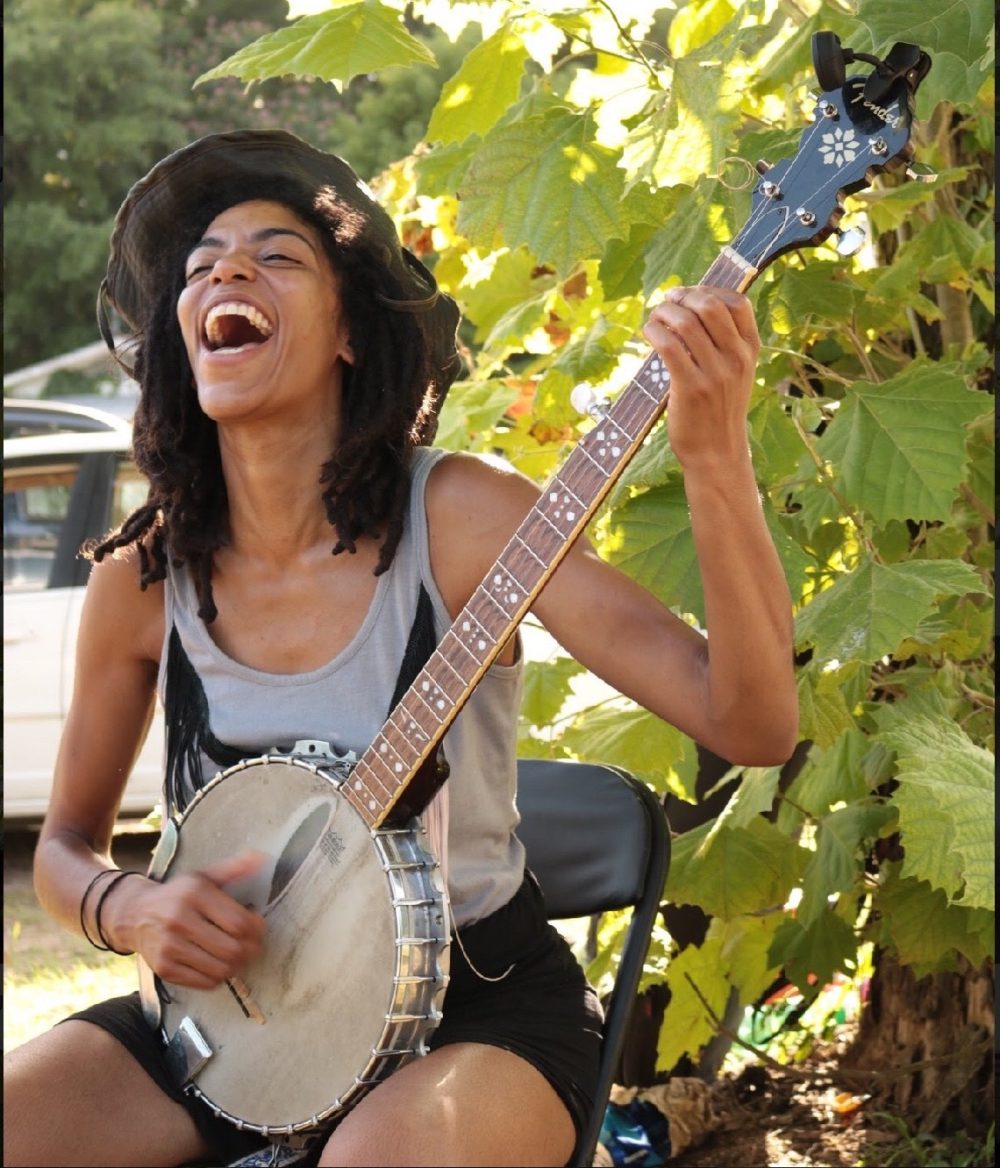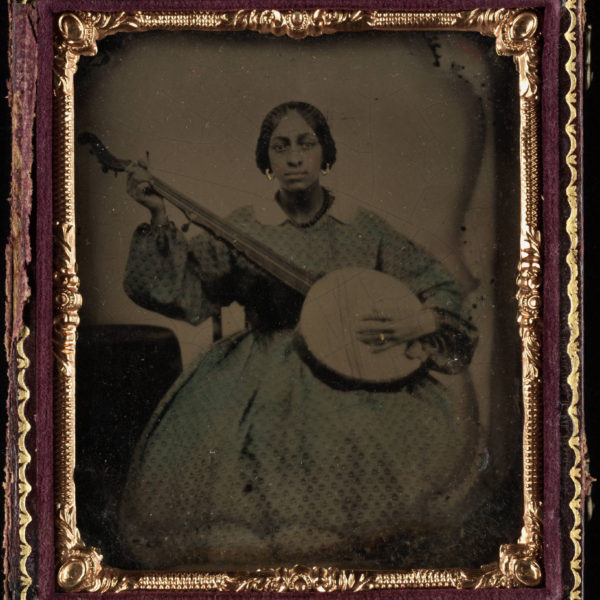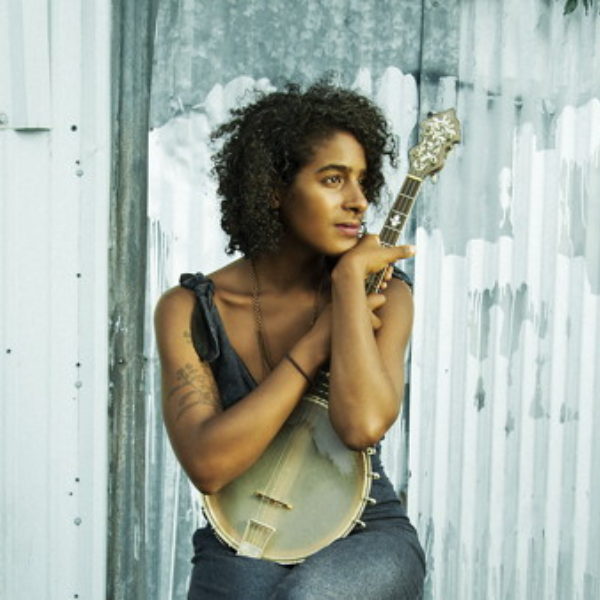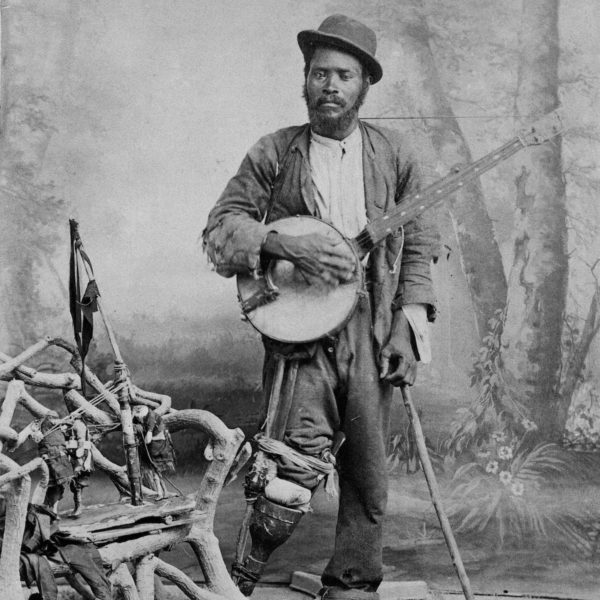
It seems like no coincidence that the banjo went into commercial production right around the same time that the banjo made its way into commercial performance in the 19th century. The two moves also were how and when the banjo went from an exclusively Black instrument to one that white people would eventually claim stewardship over.
Hannah Mayree is a singer-songwriter, banjo player and founder of the Black Banjo Reclamation Project, which has been running for about two years in Oakland, CA. Her goal is not only to re-establish the relationship between Black people and their instrument, but to use the banjo as a way to reconnect Black people to the land. When the BBRP held a gourd banjo-building workshop in February 2020, the attendees used gourds they had grown themselves—sort of the instrument equivalent of “knowing your farmer,” she said.
Mayree talked to Afropop’s Ben Richmond about the banjo not only being reclaimed, but as part of reparations. This interview has been edited for length and clarity, but Mayree has a vision of the musical instrument as part of a much larger picture of community claiming self-determination—a story that is still being written.
Ben Richmond: First off, would you like to introduce yourself?
Hannah Mayree: I am Hannah Mayree. I am a musical artist who sings and plays the banjo. I am a land steward. I am a birth worker. And I'm a community organizer. And my work connects ancestral and generational healing with the reclamation of culture and earth-based practices. At this moment I'm living in Oakland, California and I'm village building with my amazing community through practices like growing food. We are connecting food movements, which are the basis for autonomy and sovereignty in our communities, and continuing to focus on my creative self-care practices.
I think the first thing I learned about you from the Banjo Reclamation Project website is that you held a gourd banjo-building workshop—kind of the intersection of those threads.
Yes. That was a really exciting fact that was able to happen about a year ago. We had a really amazing month because we spent the first 10 days of Black History Month building banjos. We had about 15 people, we had a 10-day workshop, and that was a huge accomplishment. We were so glad to come together in community that way. To my knowledge, I've never seen people coming together in a banjo-building workshop where it was connecting that to Black people. I've seen a lot of gourd banjo workshops that have happened, but it kind of goes along with the history we were talking about. What we're doing is trying to be in the right relationship with this music and this as a practice and create it as a practice. We grow our own gourds; we are part of a goat collective. So when we say we are building banjos, it's something we take very seriously. It's like the "knowing your farmer" part of food liberation. Because we live in a globalized world, most of the things we see and most of the things we touch came here from thousands and thousands of miles away. Most of the things I'm touching—this desk, this computer—am I in a right relationship with it? Absolutely not. So I want to turn that into a good relationship and do the best I can to honor where it comes from. But really one of the best ways to do that is to know where it's coming from and be responsible for that.
And the main thing is that it is a traditional practice. It goes back to the traditional instrument in Africa. When people were brought here they brought the seeds with them and those are the seeds we're storing and those are the seeds we are helping distribute to community members, so we can bring back and revive these practices, and do so we're we're honoring the earth we stand on, the earth we come from, that many of our ancestors were stolen from. We have this in common with the banjo. We all have traveled for many generations and gone through a lot of trauma to get to this point, but we still have so much that has been passed down, that we're taking and we want to pass on to generations as well. It's a combination of honoring the past and creating our future.
When you trace back the history of the banjo to West Africa are there any instruments you see the banjo having a particular kinship with?
Definitely what I've noticed is that a lot of techniques around frailing and what they consider picking, I see most represented in West Africa. As far as other styles of playing the banjo I believe those are traced to Central Africa. And you see that with different styles of banjos and different styles of playing.
But frailing you would put with the ngoni and akonting in West Africa?
It seems like that five-string style is more akin to that.
Can I ask a practical question about the gourds? How much treatment do they need? As I understand it, it's a pretty complex process building a banjo.
A lot of that is why we do these workshops with Black people. It may seem complicated but really it is a spiritual practice. And planting a seed of something that you know is going to grow, and go through all of these elements and be weathered by the earth to get to where the vine is dying and no longer able to sustain it. But it's something where a lot of the work that we're doing goes back to what I was saying before: It's about Black people being the ones telling that story and being the ones having that knowledge.
Because what I've seen is there are people like the Seegers, and the people who made ethnomusicology and I truly believe there are ways for white folks to be allies in this process. And with the Black Banjo Reclamation Project there is a collaborative nature that comes with that territory. And I think it's really important to honor where everyone comes from. But I also think there is a certain trauma that comes from the theft that has happened that we see through the banjo. To me what has happened with the banjo has added insult to the injury of slavery. Like, not only was your family ripped apart; you can no longer be in the land of your ancestors; there are all these things that are huge traumas, but then on top of that to have your cultural tradition barred from you and have white people take and monopolize that from you. There is a certain stewardship that white folks have in their own relationship to banjos. And for me, there are all these white researchers on the banjo but they aren't necessarily focusing on the white people's relationship with that. They aren't looking into, "Oh did my ancestors own slaves? Maybe I should be paying reparations; maybe I should be doing what I can in this life and this body to see that truth and be able to own that." I see a lot of white people intrigued by the banjo, understandably, we have to understand white people have a trauma there too. That's something that needs to be addressed and it's something I hold a lot of space for. It's something I understand because I'm coming from European ancestry too and I want to support people in that journey as well. The way I understand it is, the gourd is our ancestral heritage. I think white people have a lot of questions but I think it's time they had a different perspective as well on what their role in this is. Because we have to look at where that interest really comes from.
When we look at the fetishization of Black people and our culture and that has very much been done with the banjo, so for me it's really about consent. Because when the banjo got into a place of transferring cultures it wasn't done consensually. There are stories where white people learn the banjo from Black people in Appalachia and those stories are beautiful and I hope that a lot of good has come from that. But that's what that reclamation is really about, it has to do with choice. We haven't been given the choice to have our own culture and I think that's something that really needs to be respected by white people, who then need to investigate why their culture turns violence into entertainment. White supremacy and white terrorism are huge problems in this country: It's important to name that. Antiracism can be part of banjo. It doesn't have to just be this conversation that nobody wants to have. People want to act like they are into this decolonization but it's deeper than the words or feelings. It's about trying to understand what is truth and listening to stories. Asking people "what do you think and what do you see?" That's part of the folk tradition, the oral tradition and it comes through so many different people.
You said the Black Banjo Reclamation Project has been going on for two years now? Can you talk about how the idea came to you?
It goes back to what I was speaking on. And I am very much still on a journey with this. The banjo is taking me on a journey; it's taking my local community on a journey. I'm just very excited to see where it takes us. The pain and trauma I was talking about, I think, is the pain of separation. It's a very common emotion experienced by African-American people, expressed in different ways, when you lose trust in what you see and learn to question everything. I did not personally grow up knowing the banjo has its roots in the Black community. It's bad enough what has happened all over the world to Black folks from health disparity, food apartheid, to prisons. For me to add "music" on top of that? Music is here to heal us!
So it just felt so necessary for me as someone who is playing the banjo, who already started my shows out with "So this is a banjo, it is not what you think it is." I got my hands on a banjo about 10 years ago but actually probably got a banjo about five years ago, and a lot's changed in that time. But I would start my shows off saying “This is the banjo, it is something that comes from Black folks, just so that you know that." It became something I had to say a lot. I would have people, when I was busking a long time ago, come up and just say weird stuff. “Oh, dreads and a banjo." it seemed obvious to me that people didn't expect to see that and they were almost maybe upset that they were seeing the representation that they were seeing. I also identify as not binary, so being in a queer spaces well with that—being someone who is not the dominant male gender and playing banjo while Black—it's something that people are getting a lot more used to and that makes me happy.
It really goes back to representation and back to our community. Our community can use every one of our own tools that we have because we're entitled to them. For me it started off as this idea of reparations. Banjos can cost hundreds, even thousands of dollars, so even getting access to a banjo is challenging for folks. For me, it was like, "Honestly if you're a white person and you have a banjo you might want to consider that it is not yours and you might want to return it—to me. I'm up here, this banjo might fall apart any second." Coming from that place of trauma and pain, but always using humor of course, saying “O.K., time to give up the banjo, since I'm already giving you this music." And over time, as people started responding to that really well, and we were able to get more banjos into people's hands, they were able to start their own healing practice with it. It really just shifted into the idea of self-determination. Like, "these banjos aren't that hard to make." Of course you have to be skilled to make a banjo and people do beautiful things but not many of them are Black. Part of this reclamation has to do with that. It's cool to play the banjo but there's also the truth of where they're coming from—coming from the earth. That's what it has been growing into and that's the goal to have Black builders and crafters and that is what has been happening over the last few years.
Has the project always been connected to the agricultural community you're a part of?
There's a huge connection there. It's stemming from an Indigenous instrument at any time we're looking at it from that perspective we're looking at land-based people. Looking at it in America even from a perspective under slavery it's still a relationship with the land. Similar to the banjo, land is something that has also been a source of trauma for a lot of Black folks. And it's all very tied together— people were stripped from the land they're from. That's a huge trauma and we're only now getting to the point where we can start healing that. These are both really the same wound. Because the banjo is the earth and the banjo is from the earth and so are we. We're at a point where we are reclaiming the banjo but also reclaiming the land. The goal is not to be the new colonizers, it's to be aware that it's stolen land in America. All of this is indigenous-unseated land and we have a special relationship with that, being Black folks. Part of that is the community since we live in cities—I'm looking at this pavement: It's blocking the earth from growing. It's not natural but what's here is: we have people. When we're in cities instead of having all of these green fields or trees around us, we are the nature. In cities we can steward in that way. But there is a connection between the rural and the urban, and that's what we want to strengthen— living our lives and getting what we as humans need. The Black Banjo Reclamation Project is a way to support people and communities who are on that journey. And it might be coming from the question of who are my ancestors, but that will still lead you back to land. Your ancestors were land-based people and there are foods and folkways that all of our ancestors did and that were part of our survival. I'm very aware in my body that music is a tool that helped us survive. To get me here. And I think that's really true of pretty much everyone who has survived. That's why we have such a strong connection to music. It wasn't just something we did for entertainment. It's truly something that we did as part of life.
Once the banjo is built, what sort of music do people want to play on them? Are they interested in making original songs like you do?
Yeah, definitely. I think it's a range. I've definitely been attracted to West African-style frailing and so that's something I try to pass on. But I also love the New Orleans jazz style as well. We even had someone who did a four-string tenor banjo, in more of the Caribbean or jazz style. People are experiencing a sound they haven't gotten to hear that much. You hear a banjo, you mostly hear steel string-type vibe, and I love to play my modern banjos, and I also really love to play my gourd banjo, and I love to play my other antique fretless banjo. The necks of the banjos we've been building have been similar to that style—early American and fretless. But there's so much for me who wants to create new sounds. Some people have been taking our gourd banjo design and putting on metal strings, so I think it's really where it starts getting into Afrofuturism and for people to explore that on their own. For me I really like the idea of people kind of being able to have access to what's out there. We'll listen to Caribbean music one day and jazz one day, and I really like the idea of people being exposed to a lot of different types of music and seeing what's resonated with them. Because it's different for everyone. Some people say, oh my family is from there so I connect to this style of music. I think taking any folk music traditions, even ones that were vocal or on other instruments, or gospel or any modern music, and translating that into the banjo or any type of instrument. I also love the fiddle and love the drum and having those three together sounds traditional but actually are sort of modern and their concept—playing a banjo and djembe together didn't really happen long ago, but still feels like connection.
What do you have plans next for the Black Banjo Reclamation Project? Obviously the pandemic has put a damper on in-person activities. What do you have planned for the future?
I am really excited for this coming year. I think we made it a lot further through the adjustment after "Oh everything we do is in-person, now you want us to do it on Zoom?" it was a bit of an underground year for us. But now we have exciting news: We're getting a storefront that we're going to be able to have so we can build in. We've been building a community online that Black people can join exclusively, and we have a Patreon set up, in the vein of the interest that white folks and Black folks have in what we're doing, so that we can also support folks and be supported in that way as well. We're definitely starting some seeds and are going to be sharing some seeds with folks. These are the ways we want to support our communities. We want to make it available no matter the circumstance.
Related Audio Programs











